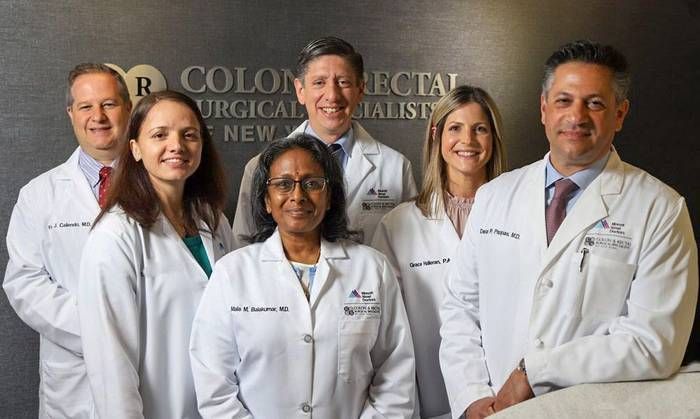
BY FRANK CALIENDO M.D.
When it comes to colorectal health and general wellness, it is important that people undergo a regular colonoscopy to check for polyps and other signs of colorectal cancer. Early detection can save lives. That is why Dr. Dean P. Pappas and the team at Colon & Rectal Surgical Specialists of New York are here to help, offering information, patient education, and checkups.
Sometimes patients contact our Garden City, NY practice have questions about common terms they hear related to colorectal health. For instance, “colonoscopy” sounds a little similar to “colostomy,” but each refers to very different things. Let’s define and go over the basics of colposcopies and colostomies.
What Is a Colonoscopy?
A colonoscopy is a type of exam that allows doctors to check the rectum, colon, and large intestine. This is a good way of detecting cancers or precancerous growths affecting these portions of the digestive tract.
Reasons for a Colonoscopy
A colonoscopy can help with the detection of colorectal cancer. It’s a good idea to undergo a regular colonoscopy every 10 years starting at age 50, though earlier or more frequent exams may be necessary if you suffer from certain bowel diseases or other kinds of medical conditions.
What to Expect During a Colonoscopy
The day prior to the exam, certain steps must be taken to empty our your colon. This includes an all-liquid diet and the use of a laxative. Follow these instructions carefully to ensure a proper exam.
During the colonoscopy, patients are typically sedated and may be given local anesthetic. A colonoscope will be inserted into the rectum. On the end of the scope is a small camera that will allow doctors to note the lining of the rectum, colon, and large intestine. Samples of the tissue may be taken if needed. On average, a colonoscopy lasts about 30 to 60 minutes.
What Is a Colostomy?
A colostomy is a surgical procedure in which a healthy part of the large intestine is rerouted and directed to an opening in the stomach. This allows patients to pass gas and eliminate feces through the hole in the stomach, which is known as a stoma.
Reasons for a Colostomy
A colostomy is recommended when part of the rectum, colon, or large intestine has been injured or damaged as a result of physical trauma or disease. In these cases, the bowels do not function properly, requiring a safe and effective means of eliminating waste from the body.
A colostomy may be temporary or permanent depending on your needs. Typically the wast will empty into a sanitary bag.
What to Expect During a Colostomy
A colostomy is performed with a patient under general anesthesia given the nature of the surgery. The health part of the bowel is rerouted so that it passes through the abdominal wall, allowing for the creation of a stoma. The location and size of this opening will vary from patient to patient.
Following the colostomy, a colorectal surgeon will provide detailed information on your diet, caring for your stoma, and what steps to expect next. If your colostomy is temporary, you will also receive information of the stoma reversal procedure, including under which conditions it would be performed and what to expect from the surgery.
Learn More About Colorectal Health
To learn more about your colorectal health and how we can help you with any issues you’re concern with, be sure to contact our team of doctors and surgeons. We at Colon & Rectal Surgical Specialists of New York are here to help. You can reach our primary Long Island office in Garden City at (516) 844-0248.

